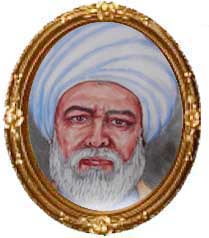Ibrahim al-Bajuri
Egyptian-Ottoman scholar and theologian (1783–1860) From Wikipedia, the free encyclopedia
Ibrāhīm ibn Muḥammad ibn Aḥmad al-Šāfiʿī al-Bājūrī (Arabic: إبراهيم بن محمد بن أحمد الشافعي الباجوري) (1784-1860) was an Egyptian-Ottoman scholar, theologian and a dean of the al-Azhar University. A follower of Imam Al-Shafiʽi, he authored over 20 works and commentaries in sacred law, tenets of faith, Islamic estate division, scholastic theology, logic and Arabic.[3]
Ibrahim ibn Muhammad Bajuri | |
|---|---|
 | |
| Personal life | |
| Born | 1784 |
| Died | 17 June 1860 (aged 75–76) |
| Main interest(s) | Islamic theology, Hadith, Islamic jurisprudence |
| Notable work(s) | Gloss (hashiya) on al-Laqqani's theological poem, Jawharat al-Tawhid |
| Religious life | |
| Religion | Islam |
| Denomination | Sunni |
| Jurisprudence | Shafi'i[2] |
| Creed | Ash'ari[2] |
| Muslim leader | |
Influenced by | |
Influenced
| |
Early life
al-Bajuri was born in the village of El Bagour, Monufia Governorate of Egypt.[1] He was raised and educated initially by his father, studying the Qur'an and its recitation.[4] At the age of 14 al-Bajuri entered al-Azhar in order to study the traditional sciences of Islam.[4] In 1798, al-Bajuri left al-Azhar due to the invasion of the French, and went to Giza where he remained until 1801; he then returned to al-Azhar to complete his education. Here, he excelled in his studies and began to teach and write on a variety of topics.[4]
Rector of al-Azhar University
al-Bajuri taught at al-Azhar University, and in 1847 became its rector,[5] a position he held until the end of his life.[1][4] During his tenure as Shaykh al-Azhar he spent much of his time teaching. His students included both young students aspiring to scholarship and also many of the great scholars of al-Azhar.[6]
Works
The most popular works in al-Bajuri's extensive literary production are:[1]
- Risāla fī ʿilm al-tawḥīd
- al-Mawahib al-Laduniyya, a commentary on the Kitab al-Shama'il of al-Tirmidhi
- a commentary on the Burda of al-Busiri
- a commentary on the Takhrib or Mukhtasar of Abu Shuja (Matn Abi Shuja) [7]
- a commentary on the Umm al-Barahin (The Foundational Proofs) of Muhammad ibn Yusuf al-Sanusi
- a gloss on a commentary on the Jawharat al-Tawhid of Ibrahim al-Laqqani
- a gloss on al-Akhdari's commentary on his own al-Sullam al-Murawnak
- a commentary on the Kifayat al-'Awām of his teacher Muḥammad al-Faḍālī
- a commentary on the Mawlid of Ahmad al-Dardir
- a commentary on a versification of the Ajārūmīya of Ibn Adjurrum.
Death
al-Bajuri died in 1276/1860.[1]
See also
References
Wikiwand - on
Seamless Wikipedia browsing. On steroids.
